Birte Glimm
Current and Future Challenges in Knowledge Representation and Reasoning
Aug 08, 2023Abstract:Knowledge Representation and Reasoning is a central, longstanding, and active area of Artificial Intelligence. Over the years it has evolved significantly; more recently it has been challenged and complemented by research in areas such as machine learning and reasoning under uncertainty. In July 2022 a Dagstuhl Perspectives workshop was held on Knowledge Representation and Reasoning. The goal of the workshop was to describe the state of the art in the field, including its relation with other areas, its shortcomings and strengths, together with recommendations for future progress. We developed this manifesto based on the presentations, panels, working groups, and discussions that took place at the Dagstuhl Workshop. It is a declaration of our views on Knowledge Representation: its origins, goals, milestones, and current foci; its relation to other disciplines, especially to Artificial Intelligence; and on its challenges, along with key priorities for the next decade.
Optimizing SPARQL Query Answering over OWL Ontologies
Feb 04, 2014



Abstract:The SPARQL query language is currently being extended by the World Wide Web Consortium (W3C) with so-called entailment regimes. An entailment regime defines how queries are evaluated under more expressive semantics than SPARQLs standard simple entailment, which is based on subgraph matching. The queries are very expressive since variables can occur within complex concepts and can also bind to concept or role names. In this paper, we describe a sound and complete algorithm for the OWL Direct Semantics entailment regime. We further propose several novel optimizations such as strategies for determining a good query execution order, query rewriting techniques, and show how specialized OWL reasoning tasks and the concept and role hierarchy can be used to reduce the query execution time. For determining a good execution order, we propose a cost-based model, where the costs are based on information about the instances of concepts and roles that are extracted from a model abstraction built by an OWL reasoner. We present two ordering strategies: a static and a dynamic one. For the dynamic case, we improve the performance by exploiting an individual clustering approach that allows for computing the cost functions based on one individual sample from a cluster. We provide a prototypical implementation and evaluate the efficiency of the proposed optimizations. Our experimental study shows that the static ordering usually outperforms the dynamic one when accurate statistics are available. This changes, however, when the statistics are less accurate, e.g., due to nondeterministic reasoning decisions. For queries that go beyond conjunctive instance queries we observe an improvement of up to three orders of magnitude due to the proposed optimizations.
Nominals, Inverses, Counting, and Conjunctive Queries or: Why Infinity is your Friend!
Jan 16, 2014



Abstract:Description Logics are knowledge representation formalisms that provide, for example, the logical underpinning of the W3C OWL standards. Conjunctive queries, the standard query language in databases, have recently gained significant attention as an expressive formalism for querying Description Logic knowledge bases. Several different techniques for deciding conjunctive query entailment are available for a wide range of DLs. Nevertheless, the combination of nominals, inverse roles, and number restrictions in OWL 1 and OWL 2 DL causes unsolvable problems for the techniques hitherto available. We tackle this problem and present a decidability result for entailment of unions of conjunctive queries in the DL ALCHOIQb that contains all three problematic constructors simultaneously. Provided that queries contain only simple roles, our result also shows decidability of entailment of (unions of) conjunctive queries in the logic that underpins OWL 1 DL and we believe that the presented results will pave the way for further progress towards conjunctive query entailment decision procedures for the Description Logics underlying the OWL standards.
OWL: Yet to arrive on the Web of Data?
Feb 01, 2012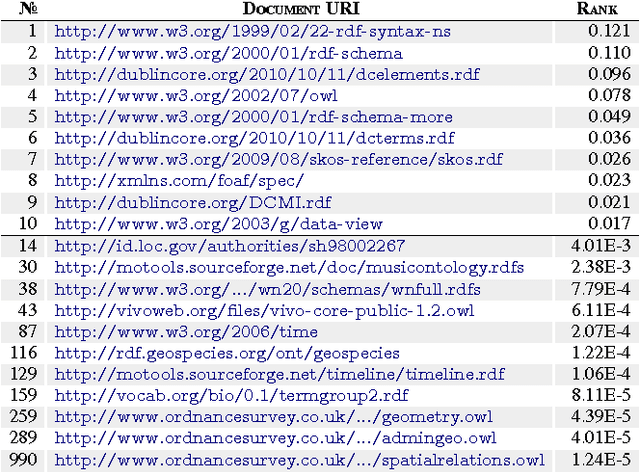
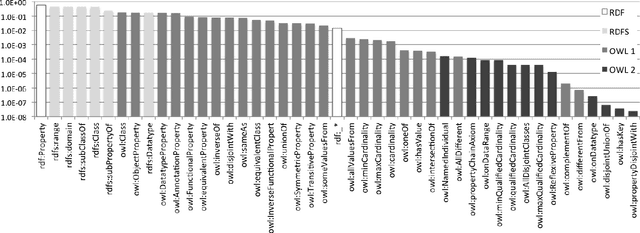
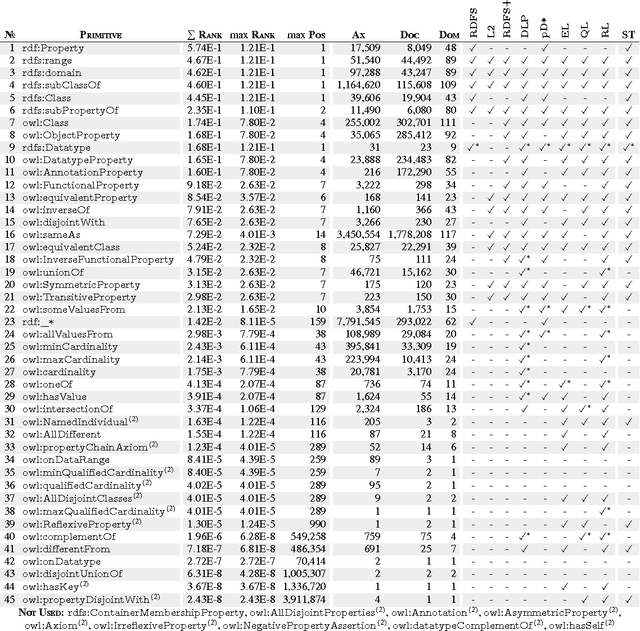
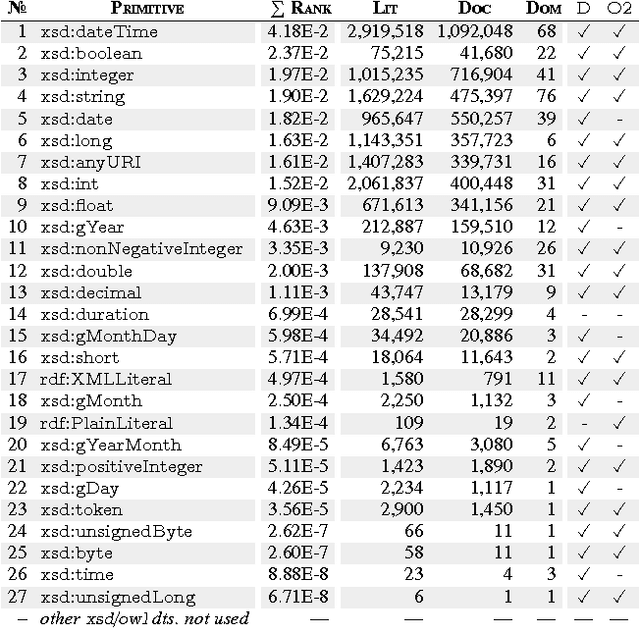
Abstract:Seven years on from OWL becoming a W3C recommendation, and two years on from the more recent OWL 2 W3C recommendation, OWL has still experienced only patchy uptake on the Web. Although certain OWL features (like owl:sameAs) are very popular, other features of OWL are largely neglected by publishers in the Linked Data world. This may suggest that despite the promise of easy implementations and the proposal of tractable profiles suggested in OWL's second version, there is still no "right" standard fragment for the Linked Data community. In this paper, we (1) analyse uptake of OWL on the Web of Data, (2) gain insights into the OWL fragment that is actually used/usable on the Web, where we arrive at the conclusion that this fragment is likely to be a simplified profile based on OWL RL, (3) propose and discuss such a new fragment, which we call OWL LD (for Linked Data).
Conjunctive Query Answering for the Description Logic SHIQ
Oct 31, 2011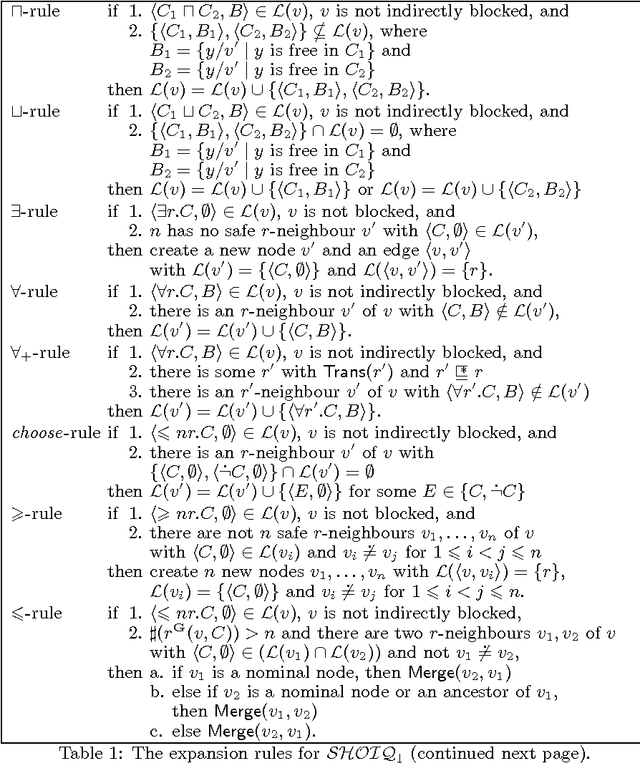
Abstract:Conjunctive queries play an important role as an expressive query language for Description Logics (DLs). Although modern DLs usually provide for transitive roles, conjunctive query answering over DL knowledge bases is only poorly understood if transitive roles are admitted in the query. In this paper, we consider unions of conjunctive queries over knowledge bases formulated in the prominent DL SHIQ and allow transitive roles in both the query and the knowledge base. We show decidability of query answering in this setting and establish two tight complexity bounds: regarding combined complexity, we prove that there is a deterministic algorithm for query answering that needs time single exponential in the size of the KB and double exponential in the size of the query, which is optimal. Regarding data complexity, we prove containment in co-NP.
 Add to Chrome
Add to Chrome Add to Firefox
Add to Firefox Add to Edge
Add to Edge